Deck 9: Exponential and Logarithmic Functions
Question
Question
Question
Question
Question
Question
Question
Question
Question
Question
Question
Question
Question
Question
Question
Question
Question
Question
Question
Question
Question
Question
Question
Question
Question
Question
Question
Question
Question
Question
Question
Question
Question
Question
Question
Question
Question
Question
Question
Question
Question
Question
Question
Question
Question
Question
Question
Question
Question
Question
Question
Question
Question
Question
Question
Question
Question
Question
Question
Question
Question
Question
Question
Question
Question
Question
Question
Question
Question
Question
Question
Question

Unlock Deck
Sign up to unlock the cards in this deck!
Unlock Deck
Unlock Deck
1/72
Play
Full screen (f)
Deck 9: Exponential and Logarithmic Functions
1
Write the logarithmic statement in exponential form. For example, "log 2 8 = 3" becomes "2 3 = 8" in exponential form. log 10 100 = 2
A) 10 2 = -100
B) 10 2 = 0
C) 2 10 = 100
D) 10 2 = 100
E) 10 100 = 2
A) 10 2 = -100
B) 10 2 = 0
C) 2 10 = 100
D) 10 2 = 100
E) 10 100 = 2
10 2 = 100
2
Graph the function. 
A)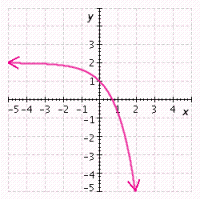
B)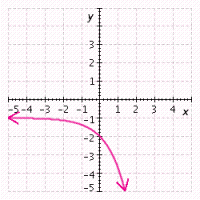
C)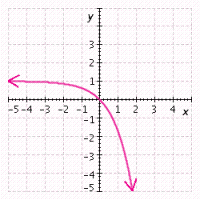
D)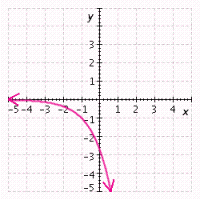

A)

B)

C)

D)


3
Graph the exponential function. f ( x ) = 3 x
A)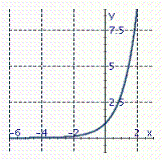
B)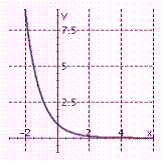
C)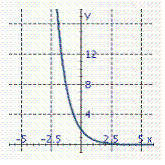
D)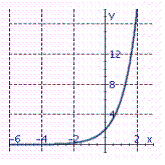
A)

B)

C)

D)


4
Graph the exponential function. f ( x ) = 3 x + 2
A)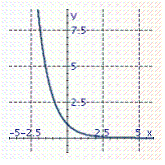
B)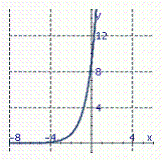
C)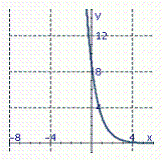
D)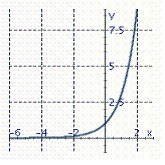
A)

B)

C)

D)


Unlock Deck
Unlock for access to all 72 flashcards in this deck.
Unlock Deck
k this deck
5
Graph the function. 
A)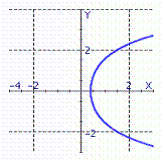
B)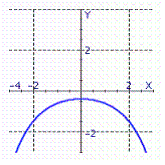
C)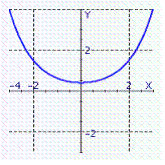
D)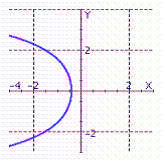
E) none of these

A)

B)

C)

D)

E) none of these

Unlock Deck
Unlock for access to all 72 flashcards in this deck.
Unlock Deck
k this deck
6
The population of the earth is approximately 6 billion people and is growing at an annual growth rate of 1.9%. Assuming a Malthusian growth model, find the world population in 45 years. Round your answer to the nearest tenth.
A) 12.4 billion
B) 14.8 billion
C) 12.1 billion
D) 14.1 billion
A) 12.4 billion
B) 14.8 billion
C) 12.1 billion
D) 14.1 billion

Unlock Deck
Unlock for access to all 72 flashcards in this deck.
Unlock Deck
k this deck
7
Graph the exponential function. f ( x ) = e x - 5
A)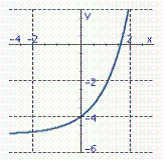
B)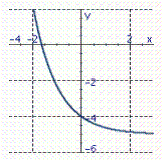
C)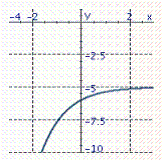
D)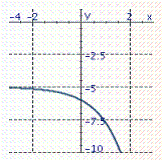
A)

B)

C)

D)


Unlock Deck
Unlock for access to all 72 flashcards in this deck.
Unlock Deck
k this deck
8
Use the formula  to find the total amount of money accumulated at the end of the indicated time period for the following investments. Please round the answers to the nearest hundredth. $300 for 13 years at 8% compounded semiannually.
to find the total amount of money accumulated at the end of the indicated time period for the following investments. Please round the answers to the nearest hundredth. $300 for 13 years at 8% compounded semiannually.
A) $813.02
B) $830.96
C) $823.83
D) $831.74
E) $875.65
 to find the total amount of money accumulated at the end of the indicated time period for the following investments. Please round the answers to the nearest hundredth. $300 for 13 years at 8% compounded semiannually.
to find the total amount of money accumulated at the end of the indicated time period for the following investments. Please round the answers to the nearest hundredth. $300 for 13 years at 8% compounded semiannually.A) $813.02
B) $830.96
C) $823.83
D) $831.74
E) $875.65

Unlock Deck
Unlock for access to all 72 flashcards in this deck.
Unlock Deck
k this deck
9
An account now contains $11,000 and has been accumulating 7% annual interest, compounded continuously, for 10 years. Find the initial deposit.
A) $5,448.44
B) $5,462.44
C) $5,467.00
D) $5,463.69
E) $5,466.19
A) $5,448.44
B) $5,462.44
C) $5,467.00
D) $5,463.69
E) $5,466.19

Unlock Deck
Unlock for access to all 72 flashcards in this deck.
Unlock Deck
k this deck
10
Graph the exponential function  . Graph the exponential function
. Graph the exponential function  on the same axes in order to compare them.
on the same axes in order to compare them.
A)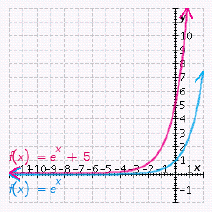
B)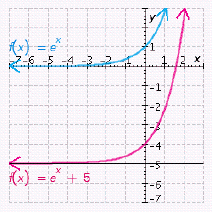
C)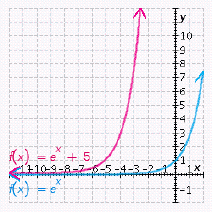
D)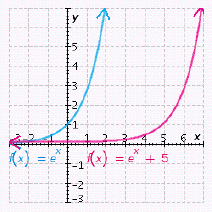
E)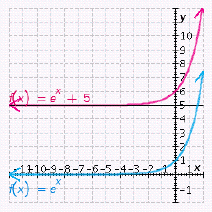
 . Graph the exponential function
. Graph the exponential function  on the same axes in order to compare them.
on the same axes in order to compare them.A)

B)

C)

D)

E)


Unlock Deck
Unlock for access to all 72 flashcards in this deck.
Unlock Deck
k this deck
11
Assuming a Malthusian growth model and annual growth rate of 1.9%, by what factor will the current population of the earth increase in 45 years?
A) 4.3
B) 2.9
C) 3.2
D) 4.2
E) 2.4
A) 4.3
B) 2.9
C) 3.2
D) 4.2
E) 2.4

Unlock Deck
Unlock for access to all 72 flashcards in this deck.
Unlock Deck
k this deck
12
Graph the exponential function  . Graph the exponential function
. Graph the exponential function  on the same axes in order to compare them.
on the same axes in order to compare them.
A)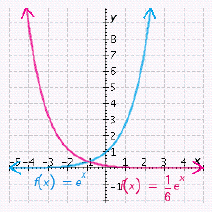
B)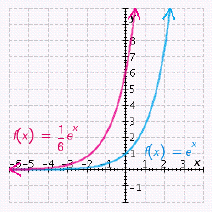
C)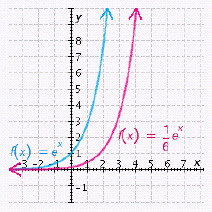
D)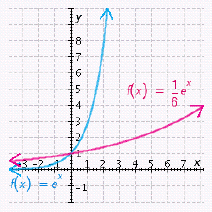
E)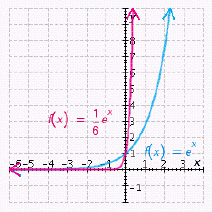
 . Graph the exponential function
. Graph the exponential function  on the same axes in order to compare them.
on the same axes in order to compare them.A)

B)

C)

D)

E)


Unlock Deck
Unlock for access to all 72 flashcards in this deck.
Unlock Deck
k this deck
13
Graph the exponential function. 
A)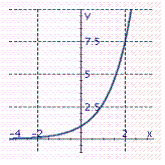
B)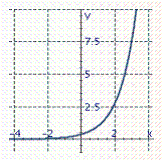
C)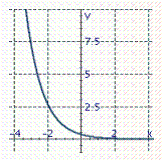
D)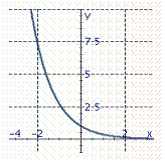

A)

B)

C)

D)


Unlock Deck
Unlock for access to all 72 flashcards in this deck.
Unlock Deck
k this deck
14
Use the formula  to find the total amount of money accumulated at the end of the indicated time period by compounding continuously. Please round the answers to the nearest hundredth. $7,000 for 35 years at 13%.
to find the total amount of money accumulated at the end of the indicated time period by compounding continuously. Please round the answers to the nearest hundredth. $7,000 for 35 years at 13%.
A) $606,927.99
B) $529,502.67
C) $566,096.83
D) $466,849.94
E) $592,807.49
 to find the total amount of money accumulated at the end of the indicated time period by compounding continuously. Please round the answers to the nearest hundredth. $7,000 for 35 years at 13%.
to find the total amount of money accumulated at the end of the indicated time period by compounding continuously. Please round the answers to the nearest hundredth. $7,000 for 35 years at 13%.A) $606,927.99
B) $529,502.67
C) $566,096.83
D) $466,849.94
E) $592,807.49

Unlock Deck
Unlock for access to all 72 flashcards in this deck.
Unlock Deck
k this deck
15
Graph the exponential function. 
A)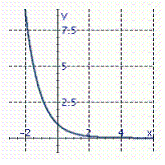
B)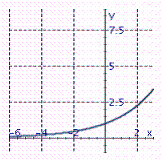
C)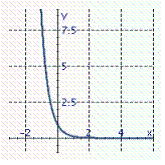
D)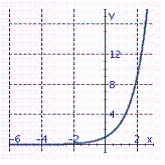

A)

B)

C)

D)


Unlock Deck
Unlock for access to all 72 flashcards in this deck.
Unlock Deck
k this deck
16
Write the logarithmic statement in exponential form. For example, "log 2 8 = 3" becomes "2 3 = 8" in exponential form. log 10 0.1 = -1
A) 1 -10 = 0.1
B) 10 -1 = 0.1
C) 10 1 = 0.1
D) 10 -0.1 = 1
E) 10 0.1 = -1
A) 1 -10 = 0.1
B) 10 -1 = 0.1
C) 10 1 = 0.1
D) 10 -0.1 = 1
E) 10 0.1 = -1

Unlock Deck
Unlock for access to all 72 flashcards in this deck.
Unlock Deck
k this deck
17
An initial deposit of $26,000 grows at an annual rate of 7% for 20 years. Compare the final balances resulting from continuous compounding and annual compounding. Round the answers to the nearest cent.
A) $100,610.89 from annual compounding; $105,433.70 from continuous compounding
B) $100,611.80 from annual compounding; $105,435.20 from continuous compounding
C) $100,613.85 from annual compounding; $105,455.20 from continuous compounding
D) $100,608.80 from annual compounding; $105,437.25 from continuous compounding
A) $100,610.89 from annual compounding; $105,433.70 from continuous compounding
B) $100,611.80 from annual compounding; $105,435.20 from continuous compounding
C) $100,613.85 from annual compounding; $105,455.20 from continuous compounding
D) $100,608.80 from annual compounding; $105,437.25 from continuous compounding

Unlock Deck
Unlock for access to all 72 flashcards in this deck.
Unlock Deck
k this deck
18
An investment of $7,000 earns 6% interest, compounded continuously. What will the investment be worth in 8 years?
A) $11,293.52
B) $11,313.71
C) $11,309.36
D) $11,312.52
E) $11,301.86
A) $11,293.52
B) $11,313.71
C) $11,309.36
D) $11,312.52
E) $11,301.86

Unlock Deck
Unlock for access to all 72 flashcards in this deck.
Unlock Deck
k this deck
19
The radioactive material Iodine-131 decays according to the formula  , where t is expressed in days. To the nearest hundredth, how much Iodine-131 will be left if a sample of 325 grams decays for 15 days?
, where t is expressed in days. To the nearest hundredth, how much Iodine-131 will be left if a sample of 325 grams decays for 15 days?
A) 285.24 grams
B) 88.13 grams
C) 83.78 grams
D) 0 grams
E) None of these
 , where t is expressed in days. To the nearest hundredth, how much Iodine-131 will be left if a sample of 325 grams decays for 15 days?
, where t is expressed in days. To the nearest hundredth, how much Iodine-131 will be left if a sample of 325 grams decays for 15 days?A) 285.24 grams
B) 88.13 grams
C) 83.78 grams
D) 0 grams
E) None of these

Unlock Deck
Unlock for access to all 72 flashcards in this deck.
Unlock Deck
k this deck
20
A 4 year certificate of deposit pays an annual rate of 8%, compounded daily. The maximum allowable deposit is $17,000. What is the most interest a depositor can earn from the CD? Round the result to the nearest cent.
A) $6,410.35
B) $6,510.45
C) $6,310.25
D) $6,400.34
E) $6,420.36
A) $6,410.35
B) $6,510.45
C) $6,310.25
D) $6,400.34
E) $6,420.36

Unlock Deck
Unlock for access to all 72 flashcards in this deck.
Unlock Deck
k this deck
21
Find the value, if possible. Give the answer to four decimal places. 
A) 0.3471
B) 0.3411
C) 0.3642
D) 0.3586
E) none of these

A) 0.3471
B) 0.3411
C) 0.3642
D) 0.3586
E) none of these

Unlock Deck
Unlock for access to all 72 flashcards in this deck.
Unlock Deck
k this deck
22
Find the value, if possible. Give the answer to four decimal places. 
A) - 0.6330
B) - 0.6482
C) - 0.6675
D) - 0.5656
E) none of these

A) - 0.6330
B) - 0.6482
C) - 0.6675
D) - 0.5656
E) none of these

Unlock Deck
Unlock for access to all 72 flashcards in this deck.
Unlock Deck
k this deck
23
Graph the function  . Remember that the graph of
. Remember that the graph of  is given.
is given. 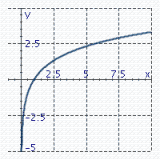
A)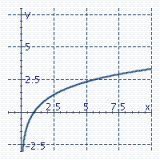
B)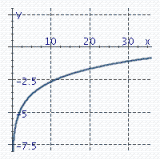
C)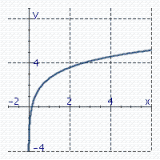
D)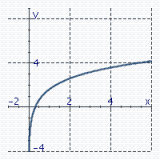
 . Remember that the graph of
. Remember that the graph of  is given.
is given. 
A)

B)

C)

D)


Unlock Deck
Unlock for access to all 72 flashcards in this deck.
Unlock Deck
k this deck
24
Use your calculator to find x when given ln x . Express answer to four decimal places. 
A) 12.7894
B) 12.7294
C) 12.7694
D) 12.7394
E) 12.7594

A) 12.7894
B) 12.7294
C) 12.7694
D) 12.7394
E) 12.7594

Unlock Deck
Unlock for access to all 72 flashcards in this deck.
Unlock Deck
k this deck
25
Graph  by reflecting the graph of
by reflecting the graph of  across the line y = x .
across the line y = x .
A)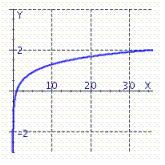
B)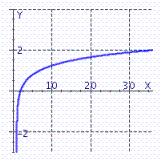
C)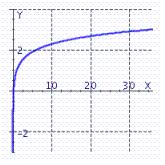
 by reflecting the graph of
by reflecting the graph of  across the line y = x .
across the line y = x .A)

B)

C)


Unlock Deck
Unlock for access to all 72 flashcards in this deck.
Unlock Deck
k this deck
26
Use your calculator to find x when given ln x . Express answer to four decimal places. 
A) 1.1838
B) 1.1238
C) 1.1638
D) 1.1338
E) 1.1538

A) 1.1838
B) 1.1238
C) 1.1638
D) 1.1338
E) 1.1538

Unlock Deck
Unlock for access to all 72 flashcards in this deck.
Unlock Deck
k this deck
27
Assume that  ,
,  , and
, and  . Use these values and the properties of logarithms to find the value. Do not use a calculator.
. Use these values and the properties of logarithms to find the value. Do not use a calculator. 
A) 3.1661
B) 2.2588
C) 1.3929
D) 2.1583
E) 2.5814
 ,
,  , and
, and  . Use these values and the properties of logarithms to find the value. Do not use a calculator.
. Use these values and the properties of logarithms to find the value. Do not use a calculator. 
A) 3.1661
B) 2.2588
C) 1.3929
D) 2.1583
E) 2.5814

Unlock Deck
Unlock for access to all 72 flashcards in this deck.
Unlock Deck
k this deck
28
Graph the function  . Remember that the graph of
. Remember that the graph of  is given.
is given. 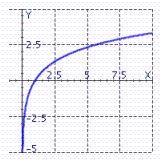
A)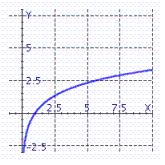
B)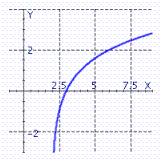
C)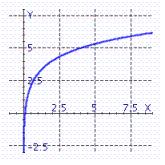
 . Remember that the graph of
. Remember that the graph of  is given.
is given. 
A)

B)

C)


Unlock Deck
Unlock for access to all 72 flashcards in this deck.
Unlock Deck
k this deck
29
Use a calculator to find each common logarithm. Express answer to four decimal places. 
A) 3.5456
B) 3.4856
C) 3.4456
D) 3.5156
E) 3.5656

A) 3.5456
B) 3.4856
C) 3.4456
D) 3.5156
E) 3.5656

Unlock Deck
Unlock for access to all 72 flashcards in this deck.
Unlock Deck
k this deck
30
An earthquake has a period of  second, and an amplitude of
second, and an amplitude of  micrometers. Find its measure on the Richter scale.
micrometers. Find its measure on the Richter scale.
A)
B)
C)
D)
E)
 second, and an amplitude of
second, and an amplitude of  micrometers. Find its measure on the Richter scale.
micrometers. Find its measure on the Richter scale.A)

B)

C)

D)

E)


Unlock Deck
Unlock for access to all 72 flashcards in this deck.
Unlock Deck
k this deck
31
Which of these graphs could represent the graph of  ?
?
A)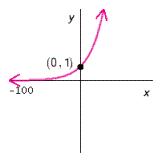
B)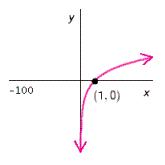
C)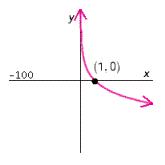
D)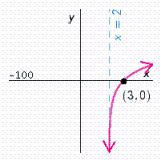
E)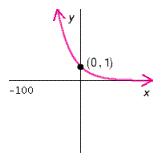
 ?
?A)

B)

C)

D)

E)


Unlock Deck
Unlock for access to all 72 flashcards in this deck.
Unlock Deck
k this deck
32
Graph  by graphing
by graphing  .
.
A)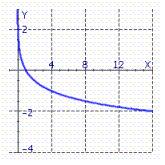
B)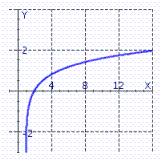
C)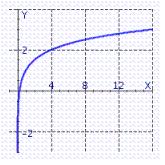
 by graphing
by graphing  .
.A)

B)

C)


Unlock Deck
Unlock for access to all 72 flashcards in this deck.
Unlock Deck
k this deck
33
Calculate how many times more intense an earthquake with a Richter number of 8.1 is than an earthquake with a Richter number of 6.2. Please round the answer to the whole number.
A) 84
B) 87
C) 79
D) 89
E) 81
A) 84
B) 87
C) 79
D) 89
E) 81

Unlock Deck
Unlock for access to all 72 flashcards in this deck.
Unlock Deck
k this deck
34
Use your calculator to find x when given ln x . Express answer to four decimal places. 
A) 0.0568
B) 0.0768
C) 0.1068
D) 0.0868
E) 0.0468

A) 0.0568
B) 0.0768
C) 0.1068
D) 0.0868
E) 0.0468

Unlock Deck
Unlock for access to all 72 flashcards in this deck.
Unlock Deck
k this deck
35
Graph the function  . Remember that the graph of
. Remember that the graph of  is given.
is given. 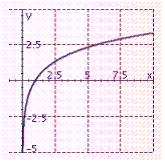
A)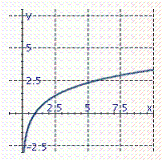
B)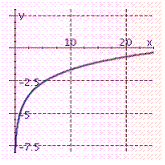
C)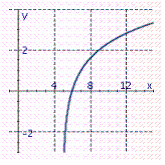
D)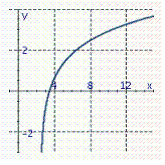
 . Remember that the graph of
. Remember that the graph of  is given.
is given. 
A)

B)

C)

D)


Unlock Deck
Unlock for access to all 72 flashcards in this deck.
Unlock Deck
k this deck
36
Find the value, if possible. Give the answer to four decimal places. 
A) 3.2484
B) 3.3051
C) 3.2088
D) 3.2677
E) none of these

A) 3.2484
B) 3.3051
C) 3.2088
D) 3.2677
E) none of these

Unlock Deck
Unlock for access to all 72 flashcards in this deck.
Unlock Deck
k this deck
37
Write the logarithmic statement in exponential form. For example, "log 2 8 = 3" becomes "2 3 = 8" in exponential form. 
A)
B)
C)
D)
E)

A)

B)

C)

D)

E)


Unlock Deck
Unlock for access to all 72 flashcards in this deck.
Unlock Deck
k this deck
38
How long will it take $1,500 to double itself if it is invested at 5% interest compounded semiannually? Please round the answer to the nearest tenth.
A) 14.0 years
B) 17.0 years
C) 14.5 years
D) 13.0 years
E) 15.0 years
A) 14.0 years
B) 17.0 years
C) 14.5 years
D) 13.0 years
E) 15.0 years

Unlock Deck
Unlock for access to all 72 flashcards in this deck.
Unlock Deck
k this deck
39
Use a calculator to find each common logarithm. Express answer to four decimal places. 
A) 0.8579
B) 0.9579
C) 0.8779
D) 1.3579
E) 0.8279

A) 0.8579
B) 0.9579
C) 0.8779
D) 1.3579
E) 0.8279

Unlock Deck
Unlock for access to all 72 flashcards in this deck.
Unlock Deck
k this deck
40
Which of these graphs could represent the graph of  ?
?
A)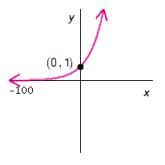
B)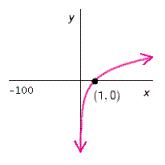
C)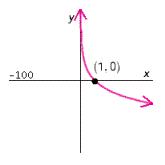
D)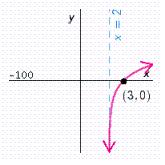
E)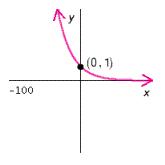
 ?
?A)

B)

C)

D)

E)


Unlock Deck
Unlock for access to all 72 flashcards in this deck.
Unlock Deck
k this deck
41
Write the logarithm as a sum and/or difference of logarithms of a single quantity. Then simplify if possible. Assume that q and w are positive numbers. 
A)
B)
C)
D)
E)

A)

B)

C)

D)

E)


Unlock Deck
Unlock for access to all 72 flashcards in this deck.
Unlock Deck
k this deck
42
Assume that  ,
,  ,
,  , and
, and 
 are positive numbers.Use the properties of logarithms to write the expression in terms of the logarithms of x , y , and z .
are positive numbers.Use the properties of logarithms to write the expression in terms of the logarithms of x , y , and z . 
A) log b x log b y log b z
B) log b x + log b y + log b z
C) - log b x - log b y - log b z
D) log b x - log b y - log b z
 ,
,  ,
,  , and
, and 
 are positive numbers.Use the properties of logarithms to write the expression in terms of the logarithms of x , y , and z .
are positive numbers.Use the properties of logarithms to write the expression in terms of the logarithms of x , y , and z . 
A) log b x log b y log b z
B) log b x + log b y + log b z
C) - log b x - log b y - log b z
D) log b x - log b y - log b z

Unlock Deck
Unlock for access to all 72 flashcards in this deck.
Unlock Deck
k this deck
43
A piece of machinery valued at $38,000 depreciates at a rate of 7% yearly. How long will it take until it has a value of $19,000? Please round the answer to the nearest tenth.
A) 11.9 years
B) 14.9 years
C) 12.9 years
D) 9.9 years
E) 8.9 years
A) 11.9 years
B) 14.9 years
C) 12.9 years
D) 9.9 years
E) 8.9 years

Unlock Deck
Unlock for access to all 72 flashcards in this deck.
Unlock Deck
k this deck
44
Use the change of base formula to identify the expression that is equivalent to  .
.
A)
B)
C)
D)
 .
.A)

B)

C)

D)


Unlock Deck
Unlock for access to all 72 flashcards in this deck.
Unlock Deck
k this deck
45
Use a calculator and the change-of-base formula to find the logarithm to four decimal places. 
A) 1.0419
B) - 1.4650
C) 1.3645
D) - 1.4572
E) 2.2304

A) 1.0419
B) - 1.4650
C) 1.3645
D) - 1.4572
E) 2.2304

Unlock Deck
Unlock for access to all 72 flashcards in this deck.
Unlock Deck
k this deck
46
How long will it take $200 to triple itself if it is invested at 8% interest compounded continuously? Please round the answer to the nearest tenth.
A) 12.7 years
B) 14.2 years
C) 16.7 years
D) 14.7 years
E) 13.7 years
A) 12.7 years
B) 14.2 years
C) 16.7 years
D) 14.7 years
E) 13.7 years

Unlock Deck
Unlock for access to all 72 flashcards in this deck.
Unlock Deck
k this deck
47
Assume that x , y , and b ( b ≠ 1) are positive numbers. Use the properties of logarithms to write the expression in terms of the logarithms of x and y . 
A)
B)
C)
D)
E)

A)

B)

C)

D)

E)


Unlock Deck
Unlock for access to all 72 flashcards in this deck.
Unlock Deck
k this deck
48
Assume that  ,
,  ,
,  , and
, and 
 are positive numbers. Use the properties of logarithms to write the expression in terms of the logarithms of
are positive numbers. Use the properties of logarithms to write the expression in terms of the logarithms of  ,
,  , and
, and  .
. 
A)
B)
C)
D)
E)
 ,
,  ,
,  , and
, and 
 are positive numbers. Use the properties of logarithms to write the expression in terms of the logarithms of
are positive numbers. Use the properties of logarithms to write the expression in terms of the logarithms of  ,
,  , and
, and  .
. 
A)

B)

C)

D)

E)


Unlock Deck
Unlock for access to all 72 flashcards in this deck.
Unlock Deck
k this deck
49
Assume that  ,
,  ,
,  , and
, and  are positive numbers Use the properties of logarithms to write the expression in terms of the logarithms of
are positive numbers Use the properties of logarithms to write the expression in terms of the logarithms of  ,
,  , and
, and  .
. 
A)
B)
C)
D)
E)
 ,
,  ,
,  , and
, and  are positive numbers Use the properties of logarithms to write the expression in terms of the logarithms of
are positive numbers Use the properties of logarithms to write the expression in terms of the logarithms of  ,
,  , and
, and  .
. 
A)

B)

C)

D)

E)


Unlock Deck
Unlock for access to all 72 flashcards in this deck.
Unlock Deck
k this deck
50
Use the properties of logarithms to write  as the logarithm of a single quantity. Assume x and y are positive numbers.
as the logarithm of a single quantity. Assume x and y are positive numbers.
A)
B)
C)
D)
 as the logarithm of a single quantity. Assume x and y are positive numbers.
as the logarithm of a single quantity. Assume x and y are positive numbers.A)

B)

C)

D)


Unlock Deck
Unlock for access to all 72 flashcards in this deck.
Unlock Deck
k this deck
51
Assume that  and
and  . Use the change-of-base formula to find the logarithm to four decimal places.
. Use the change-of-base formula to find the logarithm to four decimal places. 
A) 1.6812
B) 0.5579
C) 2.4771
D) 1.7925
 and
and  . Use the change-of-base formula to find the logarithm to four decimal places.
. Use the change-of-base formula to find the logarithm to four decimal places. 
A) 1.6812
B) 0.5579
C) 2.4771
D) 1.7925

Unlock Deck
Unlock for access to all 72 flashcards in this deck.
Unlock Deck
k this deck
52
Find the value, if possible. Give the answer to four decimal places. 
A) 0.3738
B) 0.3459
C) 0.3575
D) 0.3631
E) none of these

A) 0.3738
B) 0.3459
C) 0.3575
D) 0.3631
E) none of these

Unlock Deck
Unlock for access to all 72 flashcards in this deck.
Unlock Deck
k this deck
53
Use the properties of logarithms to write  as a sum, difference, or product of logarithms. Assume x and z are positive numbers.
as a sum, difference, or product of logarithms. Assume x and z are positive numbers.
A)
B)
C)
D)
 as a sum, difference, or product of logarithms. Assume x and z are positive numbers.
as a sum, difference, or product of logarithms. Assume x and z are positive numbers.A)

B)

C)

D)


Unlock Deck
Unlock for access to all 72 flashcards in this deck.
Unlock Deck
k this deck
54
Write the logarithmic expression as one logarithm. Assume that u , i , and p are positive numbers. 
A)
B)
C)
D)
E)

A)

B)

C)

D)

E)


Unlock Deck
Unlock for access to all 72 flashcards in this deck.
Unlock Deck
k this deck
55
Which of these graphs could represent the graph of y = ln 3 x ?
A)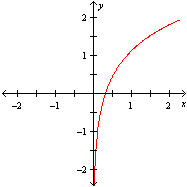
B)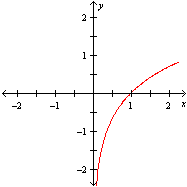
C)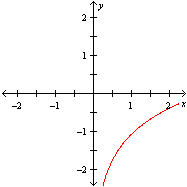
D)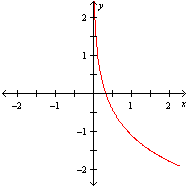
A)

B)

C)

D)


Unlock Deck
Unlock for access to all 72 flashcards in this deck.
Unlock Deck
k this deck
56
Which of the following could represent the graph of y = 0.5ln x + 1?
A)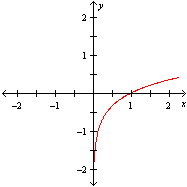
B)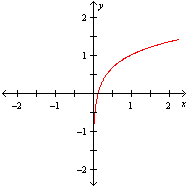
C)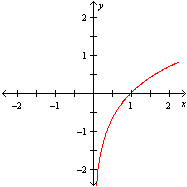
D)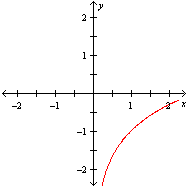
A)

B)

C)

D)


Unlock Deck
Unlock for access to all 72 flashcards in this deck.
Unlock Deck
k this deck
57
Assume that  , and
, and  . Use these values and the properties of logarithms to find the value. Do not use a calculator.
. Use these values and the properties of logarithms to find the value. Do not use a calculator. 
A) 0.1383
B) 0.2466
C) 0.0807
D) 0.1461
E) 0.1230
 , and
, and  . Use these values and the properties of logarithms to find the value. Do not use a calculator.
. Use these values and the properties of logarithms to find the value. Do not use a calculator. 
A) 0.1383
B) 0.2466
C) 0.0807
D) 0.1461
E) 0.1230

Unlock Deck
Unlock for access to all 72 flashcards in this deck.
Unlock Deck
k this deck
58
Assume that  ,
,  , and
, and  . Use these values and the properties of logarithms to find the value. Do not use a calculator.
. Use these values and the properties of logarithms to find the value. Do not use a calculator. 
A) 1.4905
B) 2.3978
C) 3.2637
D) 2.4983
E) 2.9214
 ,
,  , and
, and  . Use these values and the properties of logarithms to find the value. Do not use a calculator.
. Use these values and the properties of logarithms to find the value. Do not use a calculator. 
A) 1.4905
B) 2.3978
C) 3.2637
D) 2.4983
E) 2.9214

Unlock Deck
Unlock for access to all 72 flashcards in this deck.
Unlock Deck
k this deck
59
How long will it take $900 to double itself if it is invested at 11% interest compounded semiannually? Please round the answer to the nearest tenth.
A) 6.5 years
B) 9.5 years
C) 7.0 years
D) 5.5 years
E) 7.5 years
A) 6.5 years
B) 9.5 years
C) 7.0 years
D) 5.5 years
E) 7.5 years

Unlock Deck
Unlock for access to all 72 flashcards in this deck.
Unlock Deck
k this deck
60
Assume that x and b ( b ≠ 1) are positive numbers. Use the properties of logarithms to write the expression as the logarithm of a single quantity. 
A)
B)
C)
D)
E)

A)

B)

C)

D)

E)


Unlock Deck
Unlock for access to all 72 flashcards in this deck.
Unlock Deck
k this deck
61
Suppose that Nora invested $900 at 9.25% compounded annually for 9 years and Patti invested $900 at 9% compounded quarterly for 9 years. At the end of 9 years, who will have the most money and by how much (to the nearest dollar)?
A) Nora by $10
B) Patti by $3
C) Nora by $3
D) Patti by $10
E) They will have equal amounts of money.
A) Nora by $10
B) Patti by $3
C) Nora by $3
D) Patti by $10
E) They will have equal amounts of money.

Unlock Deck
Unlock for access to all 72 flashcards in this deck.
Unlock Deck
k this deck
62
Calculate how many times more intense an earthquake with a Richter number of 8.1 is than an earthquake with a Richter number of 6.9. Please round the answer to the whole number.
A) 21
B) 24
C) 16
D) 26
E) 18
A) 21
B) 24
C) 16
D) 26
E) 18

Unlock Deck
Unlock for access to all 72 flashcards in this deck.
Unlock Deck
k this deck
63
How long will it take $800 to double itself if it is invested at 5% interest compounded semiannually? Please round the answer to the nearest tenth.
A) 14.0 years
B) 17.0 years
C) 14.5 years
D) 13.0 years
E) 15.0 years
A) 14.0 years
B) 17.0 years
C) 14.5 years
D) 13.0 years
E) 15.0 years

Unlock Deck
Unlock for access to all 72 flashcards in this deck.
Unlock Deck
k this deck
64
Solve the logarithmic equation. Check the solution. 
A) x = 0
B) x = 1
C) x = 2
D) x = 3

A) x = 0
B) x = 1
C) x = 2
D) x = 3

Unlock Deck
Unlock for access to all 72 flashcards in this deck.
Unlock Deck
k this deck
65
Business equipment is often depreciated using the double declining-balance method. In this method, a piece of equipment with a life expectancy of N years, costing C dollars, will depreciate to a value of V dollars in n years, where n is given by the formula:  A computer that cost $14,000 has a life expectancy of 5 years. If it has depreciated to a value of $1,600, how old is it? Round the answer to the nearest tenth of the year.
A computer that cost $14,000 has a life expectancy of 5 years. If it has depreciated to a value of $1,600, how old is it? Round the answer to the nearest tenth of the year.
A) 4.2 years old
B) 6.1 years old
C) 2.5 years old
D) 5.3 years old
E) 4.7 years old
 A computer that cost $14,000 has a life expectancy of 5 years. If it has depreciated to a value of $1,600, how old is it? Round the answer to the nearest tenth of the year.
A computer that cost $14,000 has a life expectancy of 5 years. If it has depreciated to a value of $1,600, how old is it? Round the answer to the nearest tenth of the year.A) 4.2 years old
B) 6.1 years old
C) 2.5 years old
D) 5.3 years old
E) 4.7 years old

Unlock Deck
Unlock for access to all 72 flashcards in this deck.
Unlock Deck
k this deck
66
Solve the logarithmic equation. Check the solution. 
A) 10
10
B) 1,000
1,000
C) 10,000
10,000
D) 100
100
E) 1
1

A)
 10
10B)
 1,000
1,000C)
 10,000
10,000D)
 100
100E)
 1
1
Unlock Deck
Unlock for access to all 72 flashcards in this deck.
Unlock Deck
k this deck
67
Solve the exponential equation and express approximate solutions to the nearest hundredth. 7 x + 4 = 41
A) x = 1.81
B) x = 1.86
C) x = 2.07
D) x = 1.74
E) x = 2.01
A) x = 1.81
B) x = 1.86
C) x = 2.07
D) x = 1.74
E) x = 2.01

Unlock Deck
Unlock for access to all 72 flashcards in this deck.
Unlock Deck
k this deck
68
Solve the logarithmic equation. Check the solution. 
A) x = 5
B) x = 4
C) x = 7
D) x = 6

A) x = 5
B) x = 4
C) x = 7
D) x = 6

Unlock Deck
Unlock for access to all 72 flashcards in this deck.
Unlock Deck
k this deck
69
Solve the exponential equation and express approximate solutions to the nearest hundredth. 8 25 x + 3 = 34 x + 8
A) x = 0.75
B) x = 0.83
C) x = 0.91
D) x = 0.45
E) x = 8.48
A) x = 0.75
B) x = 0.83
C) x = 0.91
D) x = 0.45
E) x = 8.48

Unlock Deck
Unlock for access to all 72 flashcards in this deck.
Unlock Deck
k this deck
70
Find the dB gain of an amplifier if the output voltage is 30 volts when the input voltage is 0.6 volt. Round your answer to the nearest hundredth.
A) 3.00 dB
B) 49.24 dB
C) 1.70 dB
D) 33.98 dB
E) None of these
A) 3.00 dB
B) 49.24 dB
C) 1.70 dB
D) 33.98 dB
E) None of these

Unlock Deck
Unlock for access to all 72 flashcards in this deck.
Unlock Deck
k this deck
71
Solve the exponential equation and express solution to the nearest hundredth. 
A) x = 1.76
B) x = 2.16
C) x = 1.26
D) x = 2.36
E) x = 1.96

A) x = 1.76
B) x = 2.16
C) x = 1.26
D) x = 2.36
E) x = 1.96

Unlock Deck
Unlock for access to all 72 flashcards in this deck.
Unlock Deck
k this deck
72
The number of grams Q of a certain radioactive substance present after t seconds is given by the equation  . How many grams remain after 14 seconds? Please round the answers to the nearest whole.
. How many grams remain after 14 seconds? Please round the answers to the nearest whole.
A) Q = 1,309 grams
B) Q = 1,283 grams
C) Q = 1,490 grams
D) Q = 1,232 grams
E) Q = 1,233 grams
 . How many grams remain after 14 seconds? Please round the answers to the nearest whole.
. How many grams remain after 14 seconds? Please round the answers to the nearest whole.A) Q = 1,309 grams
B) Q = 1,283 grams
C) Q = 1,490 grams
D) Q = 1,232 grams
E) Q = 1,233 grams

Unlock Deck
Unlock for access to all 72 flashcards in this deck.
Unlock Deck
k this deck


